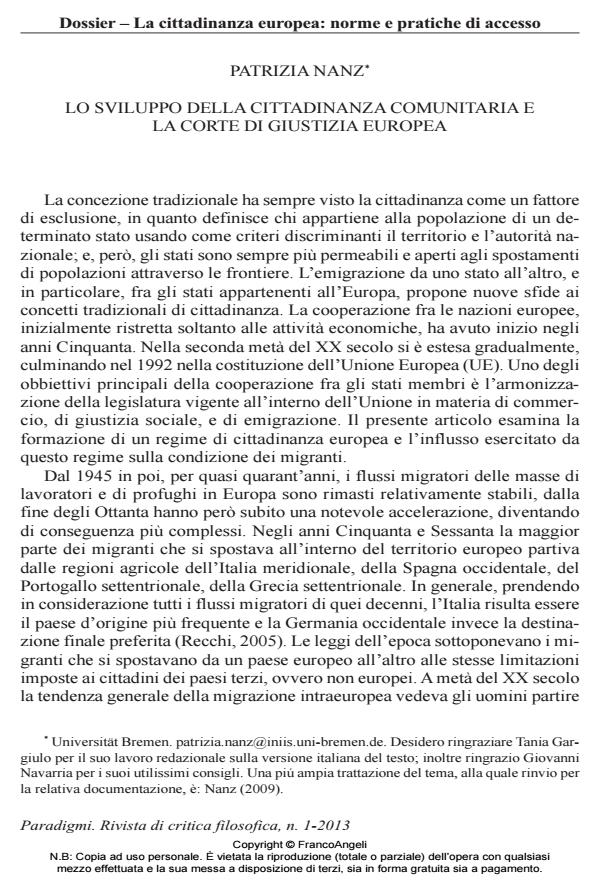Lo sviluppo della cittadinanza comunitaria e la corte di giustizia europea
Titolo Rivista PARADIGMI
Autori/Curatori Patrizia Nanz
Anno di pubblicazione 2013 Fascicolo 2013/1 Lingua Italiano
Numero pagine 14 P. 111-124 Dimensione file 170 KB
DOI 10.3280/PARA2013-001007
Il DOI è il codice a barre della proprietà intellettuale: per saperne di più
clicca qui
Qui sotto puoi vedere in anteprima la prima pagina di questo articolo.
Se questo articolo ti interessa, lo puoi acquistare (e scaricare in formato pdf) seguendo le facili indicazioni per acquistare il download credit. Acquista Download Credits per scaricare questo Articolo in formato PDF

FrancoAngeli è membro della Publishers International Linking Association, Inc (PILA)associazione indipendente e non profit per facilitare (attraverso i servizi tecnologici implementati da CrossRef.org) l’accesso degli studiosi ai contenuti digitali nelle pubblicazioni professionali e scientifiche
Il saggio analizza, sotto l’aspetto normativo-legislativo, la mobilità delle persone e i suoi riflessi impliciti sul regime di cittadinanza che si sta costituendo nell’Unione Europea. Si intende dimostrare in primo luogo che la cittadinanza dell’Unione implica la dissociazione fra la nazionalità (appartenenza) e la cittadinanza (condizione legale); essa prefigura una sfera più astratta di cooperazione fra non concittadini, che dipende dalla loro capacità di esercitare la cittadinanza in forme interculturali e transnazionali. Si intende poi mostrare come la Corte di giustizia europea con le sue sentenze abbia promosso questa concezione transnazionale della cittadinanza europea.;
Keywords:Cittadinanza europea, Corte Europea di Giustizia, Libertà di movimento, Mobilità, Nazionalità, Non-discriminazione.
- Baer S. (2004). Citizenship in Europe and the Construction of Gender by Law in the European Charter of Fundamental Rights. In: Knop K., ed. Gender and Human Rights. Oxford: Oxford University Press: 83-112. DOI: 10.1093/acprof:oso/9780199260911.003.0004
- Benhabib S. (2004). The Rights of Others. Aliens, Residents and Citizens. Cambridge: Press Syndacate (trad. it.: I diritti degli altri. Stranieri, residenti, cittadini. Milano: Cortina, 2006).
- Benhabib J. & Resnik L., eds. (2009). Migration and Mobilities. Citizenship, Borders, and Gender. New York: New York University Press
- Føllesdal A. (2002). Citizenship: Global and European. In: Dower N. e Williams J., eds. Global Citizenship: A Critical Reader. Edinburgh: Edinburgh University Press
- Friedrich F. & Nanz P. (2007). The EU’s Civil Society from a Normative-Democratic Point of View: The Case of the EU’s Migration Policy. In: Ruzza C. & della Sala V., eds. Governance and Civil Society: Theoretical and Empirical Perspectives. Manchester: Manchester University Press: 113-133.
- Geddes A. (2000). Lobbying for Migrant Inclusion in the EU: New Opportunities for Transnational Advocacy? Journal of European Public Policy 7(4): 632-649. DOI: 10.1080/13501760050165406
- Geddes A. (2003). The Politics of Migration and Immigration in Europe. London: Sage.
- Guild E. (2005). The Legal Elements of European Identity: EU Citizenship and Migration Law. The Hague: Kluwer Law International.
- Kastoryano R. (2003). Transnational Networks and Political Participation: The Place of Immigrants in the European Union. In: Berezin M. & Schain M., eds. Europe without Borders: Remapping Territory, Citizenship, and Identity in a Transnational Age. Baltimore: John Hopkins University: 64-88.
- Kilpatrick C. (2004). Emancipation through Law or Emasculation of Law? The Nation- State, the EU, and Gender Equality at Work. In: Conaghan J., Fischi R.M. & Klare K., eds. Labour Law in an Era of Globalization: Transformative Practices and Possibilities. New York: Oxford University Press: 489-509. DOI: 10.1093/acprof:oso/9780199271818.003.0026
- Kostakopoulou T. (1996). Towards a Theory of Constructive Citizenship in Europe. Journal of Political Philosophy, 4: 337-356 DOI: 10.1111/j.1467-9760.1996.tb00056.x
- Marshall T.H. (1950). Citizenship and Social Class, and Other Essays. Cambridge: Cambridge University Press
- Mather J.D. (2005). The Court of Justice and the Union Citizen. European Law Journal, 11(6): 722-743. DOI: 10.1111/j.1468-0386.2005.00284.x
- Nanz P. (2007). Multiple Voices: An Interdiscursive Concept of the European Public Sphere. In: Fossum J.E., Schlesinger P. & Kvaerk G.O., eds. Public Sphere and Civil Society? Transformations of the European Union. Oslo: ARENA Report, cap. 1.
- Nanz P. (2009). Mobility, Migrants, and Solidarity: Towards an Emerging European Citizenship Regime. In: S. Benhabib & L. Resnik, Migrations and Mobilities. Citizenship, Borders, and Gender. New York: New York University Press, 2009: 410-438.
- Nanz P. (2009a). Europolis. Un’idea controcorrente di integrazione politica. Milano: Feltrinelli
- Offe C. & Preuss U.K. (2006). The Problem of Legitimacy in the European Polity: Is Democratization the Answer? In: Crouch C. & Streeck W., eds. The Diversity of Democracy: Corporatism, Social Order, and Political Conflict. Cheltenham: Edward Elgar: 175-204
- Preuss U.K. (1996). Two Challenges to European Citizenship. In: Bellamy R. & Castiglione D., eds. Constitutionalism in Transformation: European and Theoretical Perspectives. Oxford: Blackwell: 142-140
- Preuss U.K. & Requejo R., eds. (1998). European Citizenship, Multiculturalism, and the State. Baden-Baden: Nomos Verlag
- Recchi E. (2005). Migrants and Europeans: An Outline of the Free Movement of Persons in the EU. In: AMID Working Paper Series, 38, Aalborg: Academy for Migration Studies in Denmark; testo disponibile in: http://www.amid.dk/pub/papers/AMID_38-2005_Recchi.pdf.
- Soysal Y.N. (1994). Limits of Citizenship: Migrants and Postnational Membership in Europe. Chicago: University of Chicago Press
- Treaty of Lisbon Amending the Treaty on European Union and the Treaty Establishing the European Community, consultabile al sito: http://www.consilium.europa.eu/uedocs/cmsUpload/cg00014.en07.pdf.
- Wernicke S. (2007). «Au nom de qui?». The European Court of Justice between Member States, Civil Society, and Union Citizens. European Law Journal, 13(3): 380-407. DOI: 10.1111/j.1468-0386.2007.00371.x
Patrizia Nanz, Lo sviluppo della cittadinanza comunitaria e la corte di giustizia europea in "PARADIGMI" 1/2013, pp 111-124, DOI: 10.3280/PARA2013-001007